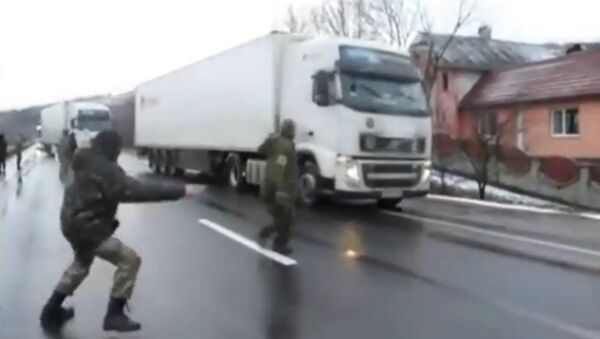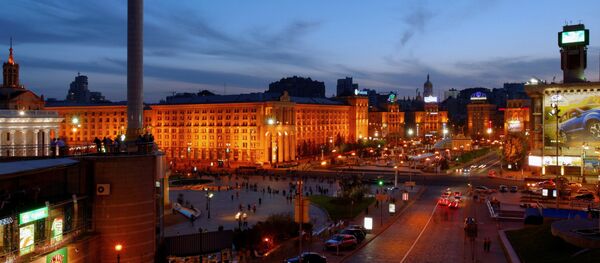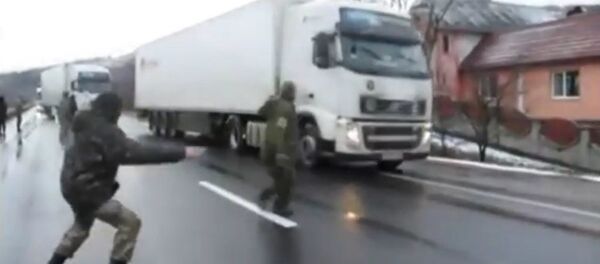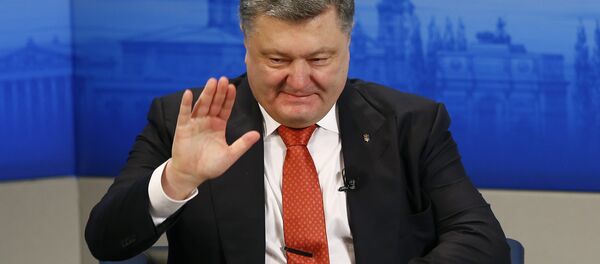When Europe pushed Ukraine to form a trade zone with it back in 2013, it likely did not bargain for what came next.
Ironically, in the name of joining Europe Ukrainian activists are now blocking cargos moving from Russia to European countries. They may well start fighting for Europe by disrupting Russian gas transit to the EU next.
According to most definitions a failed state is one that has lost the monopoly on the use of legitimate force. In such states the government, such as exists, can’t fulfil a major responsibility of the modern state: law enforcement.
In its stead, individuals take the law into their own hands, pursuing personal vendettas and conducting private justice. On that score, Ukraine has come dangerously close to to the brink.
Ukraine’s first serious claim to being a failed state dates back to November 2013, when the then government of president Viktor Yanukovych was unable or unwilling to control the crowds of Maidan protesters who occupied central Kiev and seized public buildings.
The activists claimed to be fighting against the government's decision to postpone a trade zone with the EU.
The 2014 coup ushered in a period of great violence and lawlessness in Ukraine, lasting to this day. Its particular feature has been the government’s inability to assure the most basic law enforcement. Unable to control the violence racking the nation, the weak Kiev government embraced the principle “If you can't beat them, join them”.
It has since been a silent enabler of much of the lawlessness taking place in the country.
Almost two million people in the Crimea were left without light or heat in the dead of winter.
A German minister called the incident a crime, but the Ukrainian government scarcely budged. In other episodes, roving mobs of activists all over Ukraine have been pulling down monuments dating from Ukraine’s Soviet past.
Such acts violated many Ukrainian laws that prescribe special procedures for dismantling monuments. Yet the Kiev authorities turned a blind eye, all the while privately encouraging the destructions.
Just recently Maidan activists have found a new mission for themselves. They have launched a veritable hunt for long-haul trucks with Russian license plates transiting through Ukraine to the EU, and which find themselves in the country lawfully.
The trucks are being chased, stopped, turned back, vandalized or otherwise blocked from proceeding to their destinations. All that is being done supposedly in an effort to draw attention to Ukraine’s war with Russia.
While Kiev grudgingly recognized that the activists were breaking Ukrainian law, it chose not to interfere. Instead, a few days later it issued a ban on Russian trucks entering Ukraine.
It is perhaps not hard to understand why Kiev would want to molest Russia. It is less clear why it would want to telegraph to the world its inability to maintain peace and order in its own backyard.
Apparently, the Kiev authorities don’t feel strong enough to take on the post-Maidan mobs. But this weakness comes at a high cost.
When brigandage like this breaks out on Ukrainian roads, the government should be rightfully concerned not only about the safety of the roads, but also about its standing in the eyes of its citizens and the international community.
So the damage that results from blocking the roads is being caused to Europe, not Russia or the carriers. The activists’ next step just might be cutting off the gas pipeline running through Ukraine that supplies Europe with Russian gas.
All that raises a larger question. Does the Ukrainian government believe that its inability to keep basic order on its roads instill confidence in Ukraine as a reliable partner, a secure investment destination and a safe transit territory for Europe?






